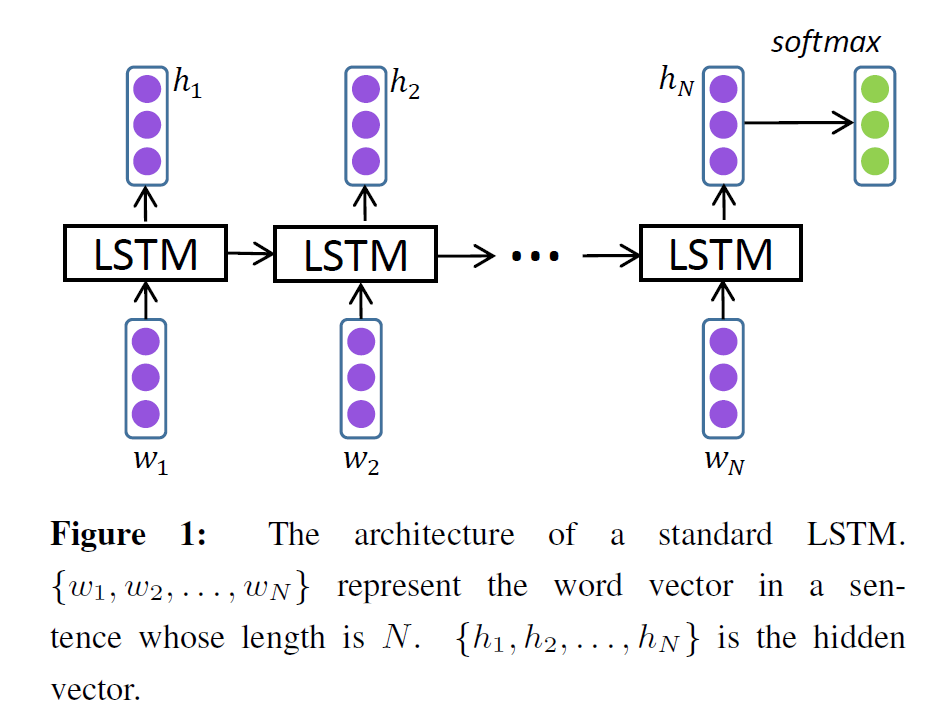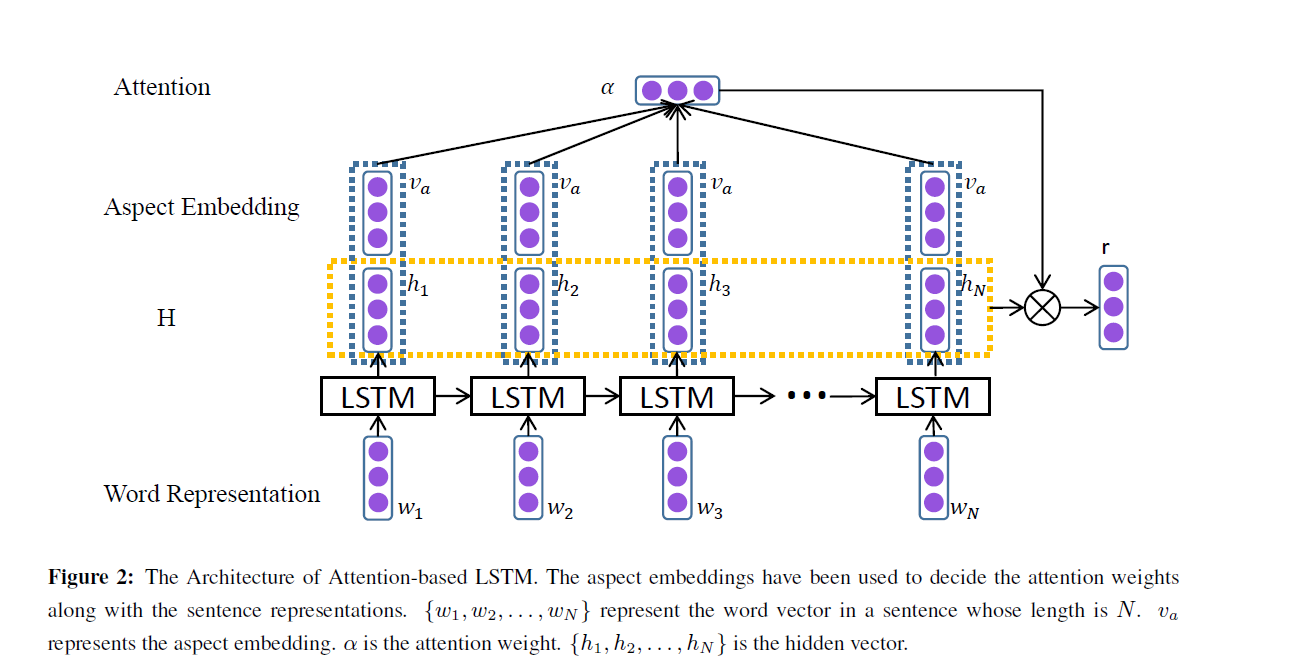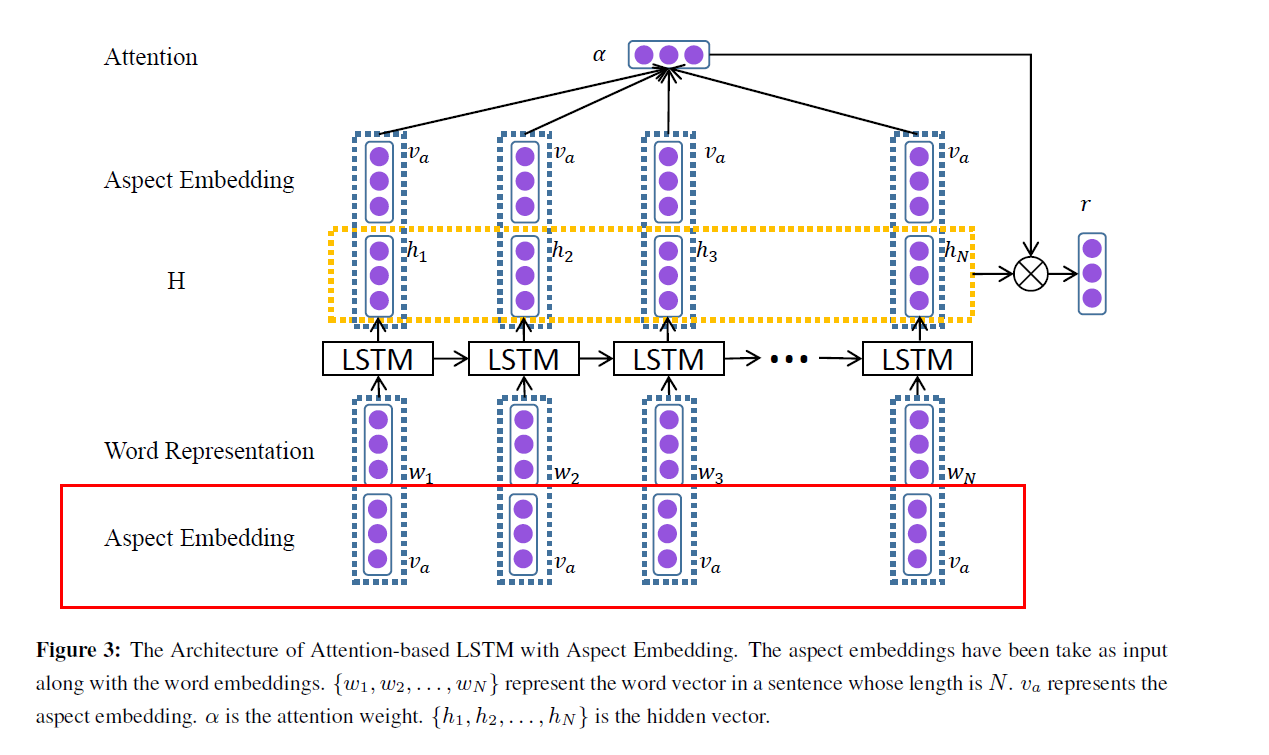Attention-based LSTM for Aspect-level Sentiment Classification (2016)
Contents
- Abstract
- Contribution
- Related Works
- Sentiment Classification at Aspect Level
- Sentiment Classification with NN
- Attention-based LSTM with Aspect Embedding
- LSTM
- AE-LSTM
- AT-LSTM
- ATAE-LSTM
0. Abstract
문장의 감정은 단지 문장의 content 뿐만 아니라, 문장 내의 aspect와도 밀접!
따라서, 문장의 내용과 aspect 사이의 connection을 찾는게 중요함!
- ex) “짜장면은 맛있었는데 서비스는 별로였어. 그래도 전체적으로는 괜찮아!”
- 음식 : Good
- 서비스 : Bad
그러기 위해, 이 논문에서는 Attention-based LSTM for aspect-level sentiment classification을 제안함
1. Contribution
- 1) Attention-based LSTM for aspect-level sentiment classification를 제안
- 2) Aspect information을 반영할 수 있는 2가지 방법을 제안
- 방법 1) concatenate aspect vector into “sentence hidden representation”
- 방법 2) additionally append the aspect vector into the “input word”
2. Related Work
2-1) Sentiment Classification at Aspect Level
대부분의 현재(현재…?2016…) approach의 문제점
- aspect 고려 없이, 전체 문장에 대한 감정만 찾으려함
\(\rightarrow\) 이를 풀기위해, manually set of features를 디자인함
이렇게 디자인된 feature들을 사용하여 sentiment classifier들이 많이 나오긴 하였으나…
- 문제점 1) highly dependent on quality of features
- 문제점 2) feature engineering is labor intensive
2-2) Sentiment Classification with NN
- 생략
3. Attention-based LSTM with Aspect Embedding
3-1) LSTM
- 생략 ( 그림만 참조 )

3-2) AE-LSTM
LSTM with Aspect Embedding
- 취지 : 각각의 aspect에 대한 embedding vector를 학습하자!
- notation
- aspect \(i\)의 embedding vector : \(v_{a_{i}} \in \mathbb{R}^{d_{a}}\)
- aspect embedding들 matrix : \(A \in \mathbb{R}^{d_{a} \times \mid A \mid }\)
3-3) AT-LSTM
Attention-based LSTM
-
기존의 LSTM은, sentiment classification에 있어서 어떠한 부분이 중요한지 캐치 X
-
Notation :
-
LSTM이 만들어낸 hidden vector들의 matrix : \(H \in \mathbb{R}^{d \times N}\)
( 구성 요소 : \(\left[h_{1}, \ldots, h_{N}\right]\) )
-
aspect \(i\)의 embedding vector : \(v_{a_{i}} \in \mathbb{R}^{d_{a}}\)
-
1로 이루어진 vector : \(e_{N} \in \mathbb{R}^{N}\)
-
-
attention weight vector \(\alpha\) 구하기!
-
과정 )
\(\begin{aligned} &M=\tanh \left(\left[\begin{array}{c} W_{h} H \\ W_{v} v_{a} \otimes e_{N} \end{array}\right]\right) \\ &\alpha=\operatorname{softmax}\left(w^{T} M\right) \\ &r=H \alpha^{T} \end{aligned}\).
- final sentence representation : \(h^{*}=\tanh \left(W_{p} r+W_{x} h_{N}\right)\)
- final prediction : \(y=\operatorname{softmax}\left(W_{s} h^{*}+b_{s}\right)\)

3-4) ATAE-LSTM
Attention-based LSTM with Aspect Embedding
-
직관적으로 알 수 있듯, AT와 AE 둘 다 사용한 것
즉, aspect embedding이 attention weight를 계산하는데에 사용됨
-
input vector에 aspect embedding을 추가한다! ( 아래 그림과 같이 )

